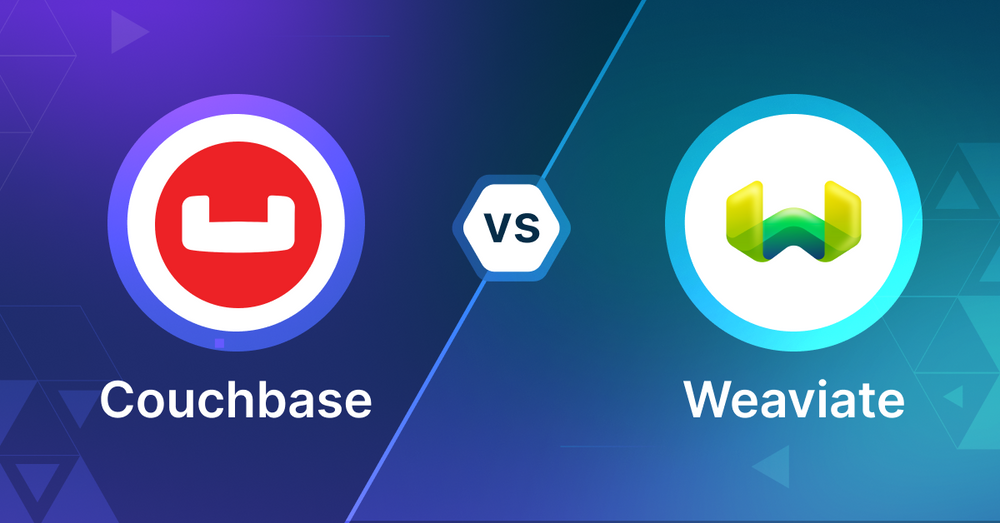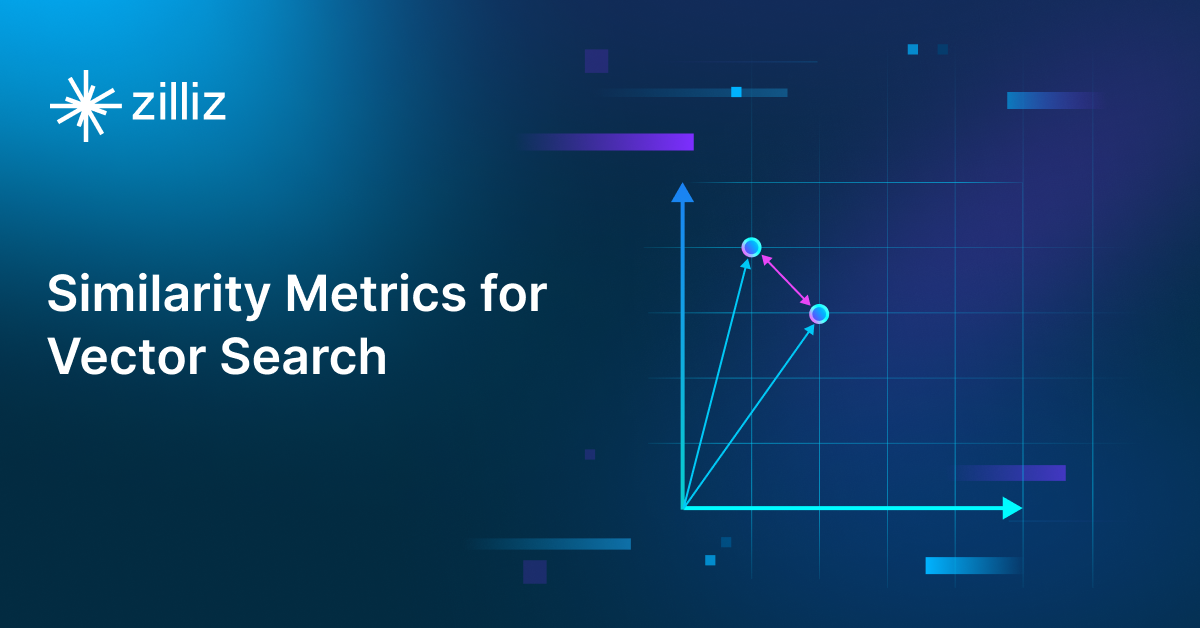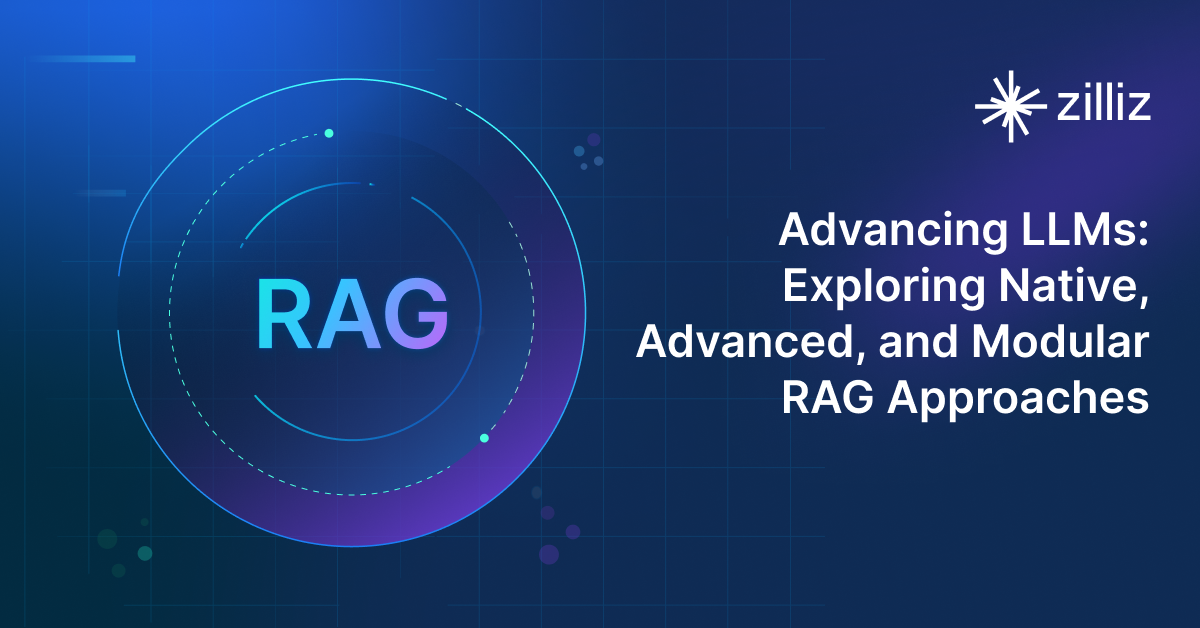Couchbase vs Weaviate Choosing the Right Vector Database for Your AI Apps

What is a Vector Database?
Before we compare Couchbase and Weaviate, let's first explore the concept of vector databases.
A vector database is specifically designed to store and query high-dimensional vectors, which are numerical representations of unstructured data. These vectors encode complex information, such as the semantic meaning of text, the visual features of images, or product attributes. By enabling efficient similarity searches, vector databases play a pivotal role in AI applications, allowing for more advanced data analysis and retrieval.
Common use cases for vector databases include e-commerce product recommendations, content discovery platforms, anomaly detection in cybersecurity, medical image analysis, and natural language processing (NLP) tasks. They also play a crucial role in Retrieval Augmented Generation (RAG), a technique that enhances the performance of large language models (LLMs) by providing external knowledge to reduce issues like AI hallucinations.
There are many types of vector databases available in the market, including:
- Purpose-built vector databases such as Milvus, Zilliz Cloud (fully managed Milvus)
- Vector search libraries such as Faiss and Annoy.
- Lightweight vector databases such as Chroma and Milvus Lite.
- Traditional databases with vector search add-ons capable of performing small-scale vector searches.
Couchbase is a distributed multi-model NoSQL document-oriented database with vector search capabilities added on. Weaviate is a purpose-built vector database. This post compares their vector search capabilities.
Couchbase: Overview and Core Technology
Couchbase is a distributed, open-source, NoSQL database that can be used to build applications for cloud, mobile, AI, and edge computing. It combines the strengths of relational databases with the versatility of JSON. Couchbase also provides the flexibility to implement vector search despite not having native support for vector indexes. Developers can store vector embeddings—numerical representations generated by machine learning models—within Couchbase documents as part of their JSON structure. These vectors can be used in similarity search use cases, such as recommendation systems or retrieval-augmented generation both based on semantic search, where finding data points close to each other in a high-dimensional space is important.
One approach to enabling vector search in Couchbase is by leveraging Full Text Search (FTS). While FTS is typically designed for text-based search, it can be adapted to handle vector searches by converting vector data into searchable fields. For instance, vectors can be tokenized into text-like data, allowing FTS to index and search based on those tokens. This can facilitate approximate vector search, providing a way to query documents with vectors that are close in similarity.
Alternatively, developers can store the raw vector embeddings in Couchbase and perform the vector similarity calculations at the application level. This involves retrieving documents and computing metrics such as cosine similarity or Euclidean distance between vectors to identify the closest matches. This method allows Couchbase to serve as a storage solution for vectors while the application handles the mathematical comparison logic.
For more advanced use cases, some developers integrate Couchbase with specialized libraries or algorithms (like FAISS or HNSW) that enable efficient vector search. These integrations allow Couchbase to manage the document store while the external libraries perform the actual vector comparisons. In this way, Couchbase can still be part of a solution that supports vector search.
By using these approaches, Couchbase can be adapted to handle vector search functionality, making it a flexible option for various AI and machine learning tasks that rely on similarity searches.
Weaviate: Overview and Core Technology
Weaviate is an open-source vector database designed to simplify AI application development. It offers built-in vector and hybrid search capabilities, easy integration with machine learning models, and a focus on data privacy. These features aim to help developers of various skill levels create, iterate, and scale AI applications more efficiently.
One of Weaviate's strengths is its fast and accurate similarity search. It uses HNSW (Hierarchical Navigable Small World) indexing to enable vector search on large datasets. Weaviate also supports combining vector searches with traditional filters, allowing for powerful hybrid queries that leverage both semantic similarity and specific data attributes.
Key features of Weaviate include:
- PQ compression for efficient storage and retrieval
- Hybrid search with an alpha parameter for tuning between BM25 and vector search
- Built-in plugins for embeddings and reranking, which ease development
Weaviate is an entry point for developers to try out vector search. It offers a developer-friendly approach with a simple setup and well-documented APIs. Deep integration with the GenAI ecosystem makes it suitable for small projects or proof-of-concept work. The target audience for Weaviate are software engineers building AI applications, data engineers working with large datasets and data scientists deploying machine learning models. Weaviate simplifies semantic search, recommendation systems, content classification and other AI features.
Weaviate is designed to scale horizontally so it can handle large datasets and high query loads by distributing data across multiple nodes in a cluster. It supports multi-modal data, works with various data types (text, images, audio, video) depending on the vectorization modules used. Weaviate provides both RESTful and GraphQL APIs for flexibility in how developers interact with the database.
However, for large-scale production environments, there are several considerations to keep in mind:
- Limited enterprise-grade security features
- Potential scalability challenges with multi-billion vector datasets
- Manual management required for newly released tiered storage options
- Horizontal scale-up requires assistance from Weaviate engineers and cannot be done automatically
This last point is particularly noteworthy, as it means organizations need to plan ahead and allocate time for scaling operations, ensuring they don't approach their system limits without proper preparation.
Key Differences
Below, we’ll dive into key differences to help you make an informed decision.
Search Methodology
Couchbase relies on Full Text Search (FTS) or external integrations to support vector search. Its approach is adaptable:
- FTS adaptation: Converts vector data into tokenized, searchable fields.
- Application-level processing: Stores vectors and computes similarity outside Couchbase.
- External libraries: Combines Couchbase with tools like FAISS for efficient vector indexing.
While these options make Couchbase versatile, they require additional development effort, as native vector search is not part of the core product.
Weaviate, on the other hand, is purpose-built for vector search. It uses HNSW indexing, a highly efficient algorithm for approximate nearest-neighbor search, to deliver fast and accurate results. Hybrid search capabilities combine vector similarity with traditional filters for more granular queries.
Data Handling
Couchbase is a general-purpose NoSQL database designed to manage structured, semi-structured, and unstructured data using JSON. It excels in scenarios where you need to mix traditional queries with AI-driven use cases. However, handling vector data requires workarounds, as Couchbase was not designed with vectors as a primary focus.
Weaviate supports multi-modal data (text, images, audio, video), provided you integrate appropriate vectorization modules. It is optimized for unstructured data and AI-centric tasks, making it a natural fit for embedding-rich datasets. However, for structured data, its capabilities may not match those of a database like Couchbase.
Scalability and Performance
Couchbase uses a distributed architecture designed for high availability and scalability, which makes it a reliable choice for handling large datasets and high query volumes. However, its vector search performance depends heavily on the external tools or application logic you integrate.
Weaviate scales horizontally by distributing data across nodes, which works well for many applications. However, scaling to multi-billion vector datasets requires careful planning and manual setup, especially for tiered storage or other advanced features.
Flexibility and Customization
Couchbase offers high flexibility in data modeling, supporting rich queries across JSON data. Developers can customize queries, workflows, and integrations to meet unique requirements.
Weaviate provides built-in support for embeddings, reranking, and hybrid search but is less flexible in terms of adapting to use cases outside its AI-focused design. Customizations tend to center around AI/ML applications rather than general database operations.
Integration and Ecosystem
Couchbase integrates with a broad range of tools, including popular data pipelines, cloud services, and external libraries. This makes it suitable if you already use Couchbase as part of your tech stack and want to extend its capabilities.
Weaviate is tightly integrated into the AI and GenAI ecosystems. It has built-in modules for vectorization and pre-trained embeddings, allowing for quick experimentation and deployment. However, its ecosystem is narrower compared to Couchbase.
Ease of Use
Couchbase requires developers to invest time in configuring vector search solutions, as it lacks out-of-the-box support. However, its mature documentation and established community are assets.
Weaviate emphasizes developer simplicity with pre-built features, clear APIs, and straightforward setup. If vector search is your primary focus, Weaviate has a significantly shorter learning curve.
Cost Considerations
Couchbase’s costs will depend on how you configure external libraries or tools for vector search. Using it for both traditional NoSQL workloads and vector search could reduce overhead, especially in hybrid applications.
Weaviate’s costs are tied to its vector search focus. While it offers a managed service, scaling to production-grade workloads with large datasets might increase operational costs due to manual scaling and tuning requirements.
Security Features
Couchbase includes enterprise-grade features such as robust authentication, role-based access control (RBAC), and encryption. It’s a strong contender for use cases requiring stringent security measures.
Weaviate has basic security features, but advanced needs—such as multi-tenant authentication—might require custom development or external solutions.
When to Choose Couchbase
Couchbase is good if you need to manage large scale distributed data with a mix of structured, semi-structured and unstructured data. It’s great for applications that require high availability, flexible querying and robust security features. Couchbase is okay if vector search is a secondary requirement as it can integrate with external tools like FAISS or do application level similarity calculations so you can have vector search without sacrificing its core strengths. Use cases like hybrid AI workloads that combine traditional database operations with machine learning benefit from its flexibility.
When to Choose Weaviate
Weaviate is good for applications where vector search is the main functionality like semantic search, recommendation systems and multimedia data retrieval. Its built-in HNSW indexing, hybrid search and pre-trained embeddings integration makes it great for projects involving unstructured data and AI/ML workflows. Weaviate’s simplicity and developer friendly APIs makes it easy to experiment and deploy, so it’s perfect for small teams, AI focused startups or proof of concept applications that need to show value fast.
Conclusion
Couchbase and Weaviate both have great features but their strengths are different. Couchbase is a flexible enterprise grade database that can adapt to vector search scenarios and support a wide range of workloads. Weaviate is purpose built for efficient and scalable vector search with seamless AI driven use cases. The choice between the two should be based on your application’s priorities, whether that’s general purpose database functionality, robust security and scalability (Couchbase) or advanced semantic search and AI first development (Weaviate). Consider your data types, performance requirements and integration needs to make the right choice.
Read this to get an overview of Couchbase and Weaviate but to evaluate these you need to evaluate based on your use case. One tool that can help with that is VectorDBBench, an open-source benchmarking tool for vector database comparison. In the end, thorough benchmarking with your own datasets and query patterns will be key to making a decision between these two powerful but different approaches to vector search in distributed database systems.
Using Open-source VectorDBBench to Evaluate and Compare Vector Databases on Your Own
VectorDBBench is an open-source benchmarking tool for users who need high-performance data storage and retrieval systems, especially vector databases. This tool allows users to test and compare different vector database systems like Milvus and Zilliz Cloud (the managed Milvus) using their own datasets and find the one that fits their use cases. With VectorDBBench, users can make decisions based on actual vector database performance rather than marketing claims or hearsay.
VectorDBBench is written in Python and licensed under the MIT open-source license, meaning anyone can freely use, modify, and distribute it. The tool is actively maintained by a community of developers committed to improving its features and performance.
Download VectorDBBench from its GitHub repository to reproduce our benchmark results or obtain performance results on your own datasets.
Take a quick look at the performance of mainstream vector databases on the VectorDBBench Leaderboard.
Read the following blogs to learn more about vector database evaluation.
Further Resources about VectorDB, GenAI, and ML
- What is a Vector Database?
- Couchbase: Overview and Core Technology
- Weaviate: Overview and Core Technology
- Key Differences
- Using Open-source VectorDBBench to Evaluate and Compare Vector Databases on Your Own
- Further Resources about VectorDB, GenAI, and ML
Content
Start Free, Scale Easily
Try the fully-managed vector database built for your GenAI applications.
Try Zilliz Cloud for FreeKeep Reading

Introducing Business Critical Plan: Enterprise-Grade Security and Compliance for Mission-Critical AI Applications
Discover Zilliz Cloud’s Business Critical Plan—offering advanced security, compliance, and uptime for mission-critical AI and vector database workloads.

Similarity Metrics for Vector Search
Exploring five similarity metrics for vector search: L2 or Euclidean distance, cosine distance, inner product, and hamming distance.

Advancing LLMs: Exploring Native, Advanced, and Modular RAG Approaches
This post explores the key components of RAG, its evolution, technical implementation, evaluation methods, and potential for real-world applications.
The Definitive Guide to Choosing a Vector Database
Overwhelmed by all the options? Learn key features to look for & how to evaluate with your own data. Choose with confidence.